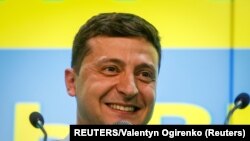The country’s early July 21 parliamentary vote has been called the 41-year-old president’s “third round” – yet another chance, after this spring’s two-round presidential election, to demonstrate the scope of his popular support and translate it into power.
With 100 percent of the ballots counted, Zelenskiy’s Servant of the People party holds 254 of the seats in Ukraine’s 450-seat Verkhovna Rada or parliament -- a roughly 56-percent majority. Its 43.16 percent of the vote makes for more than a 30-percentage-point lead over its nearest contender, the Kremlin-friendly Opposition Platform-For Life party, which currently holds 43 parliamentary seats.
Zelenskiy’s most recent rival, former President Petro Poroshenko, saw his renamed European Solidarity party finish a distant fourth, with 8.10 percent of the vote. It now holds 25 seats in parliament – a precipitous drop from the 132 it received in the 2014 elections.
Ukraine uses a mixed parliamentary system: Party lists determine half of its 424 deputies (26 seats for annexed Crimea and the disputed regions of Donetsk and Luhansk are vacant); the other half come from first-past-the-post districts. Twenty-two parties overall took part in the July 21 vote, which was originally scheduled for this fall.
Voter turnout for the election was a record low -- 49.84 percent of Ukraine’s approximately 35.6 million registered voters – but some election officials attributed that to the summer vacation season rather than to disinterest in parliament.
Zelenskiy called the early presidential election on his May 20 inauguration day, when Poroshenko-loyal deputies still controlled the legislature.
With no party now able to easily block Servant of the People, Zelenskiy can choose his prime minister at will.
“I tell you honestly, some people going now into parliament may not like this because they see themselves in this position …” Zelenskiy commented to Current Time on July 21, after the announcement of exit-poll results that gave Servant of the People the lead. “I consider that this person should be an absolutely professional economist, who doesn’t have any political decision. I would very much want this to be an absolutely independent person who never was either a prime minister, or a [parliamentary] speaker, or a leader of any faction at all.”
Zelenskiy said that consultations are ongoing and that he intends to meet with “several” people. Ukraine’s current prime minister is Volodymyr Groisman, a former member of the Poroshenko Bloc.
Earlier speculation about Groisman’s replacement had focused on two potential reform-minded coalition partners – rock musician Svyatoslav Vakarchuk, the leader of Holos (Voice) and a former MP; and Yulia Tymoshenko, a two-time former prime minister and recurring presidential candidate who leads the well-established Batkivshchina (Fatherland) party.
But Zelenskiy’s description of his party’s prime minister does not suggest either individual. Kyiv-based political analyst Oleg Saakyan believes the chances have increased for a “technocratic premier.”
They appear to be decreasing for a coalition. On July 22, Servant of the People party leader Dmitry Razumkov steered away from any talk of a coalition, telling a briefing that the party is still waiting to see “the results of our counterparts and opponents in the Verkhovna Rada,” UNIAN reported.
The president’s party may no longer require a coalition, but one 23-year-old MP from Zelenskiy’s party told RFE/RL that cooperation with other factions will still be needed “to pass some drastic reforms, some which require constitutional changes” that require a two-thirds majority.
In fact, the ability to make such changes could affect Servant of the People’s own future, noted Ukrainian political analyst Sergei Gaidai. “[I]f they preserve that architecture of the Ukrainian government, I’m afraid, as has happened more than once in Ukraine’s history, the new faces will change nothing,” he commented.
While Tymoshenko made clear to reporters on July 21 her interest in becoming a third-time prime minister, Holos has surfaced more frequently in Servant of the People mentions of a possible coalition.
But with 5.82 percent of the vote, Holos barely made it over the 5-percent threshold for entrance into parliament; Batkivshchina, with 8.18 percent, bypassed former President Poroshenko’s European Solidarity party to nip at Opposition Platform-For Life.
Neither Servant of the People, nor European Solidarity has named each other as potential partners, though both share the aim of deeper integration with the European Union and NATO,
“We don’t know how they’ll behave in the given situation,” commented European Solidarity candidate Vladimir Aryev. “We need to see results.”
Servant of the People banding together with any party could be a tall order, however, cautioned Saakyan.
“This is a very multi-faceted political party, formed on the quick from representatives of various financial-political groups, from absolutely various people who often don’t know each other. For that reason, it’ll be necessary to have a sufficiently strong supply of resilience.”
Yet with voters impatient for improvements on a range of issues, Servant of the People’s time for gaining results is short, one analyst said.
“That can play to the opposition if they’ve been in power a half year and haven’t done anything,” the analyst predicted.
Aside from an honest vote, Ukrainian voters interviewed by Current Time in Kyiv expressed hope for higher pensions, a stronger economy, peace in the conflict zone in eastern Ukraine, and, in one instance, a law against the use of off-shore companies.
Zelenskiy has stated that his party’s first priority is passage of a law that would end parliamentarians’ immunity from prosecution.
One candidate MP playing table soccer in the president’s campaign headquarters on election night emphasized that Servant of the People has done its homework and knows it needs to capitalize on voters’ good will while it can.
“I hope that from the first days [in parliament], we’ll get down to real work because it’s not a secret for anyone that the [next] half year is when there are the biggest possibilities …” commented 33-year-old MP candidate Vladislav Krikliy to Current Time’s Timur Olevsky.
- Updated on July 26, 2019. With additional reporting by UNIAN and Ukrainskaya Pravda





Facebook Forum